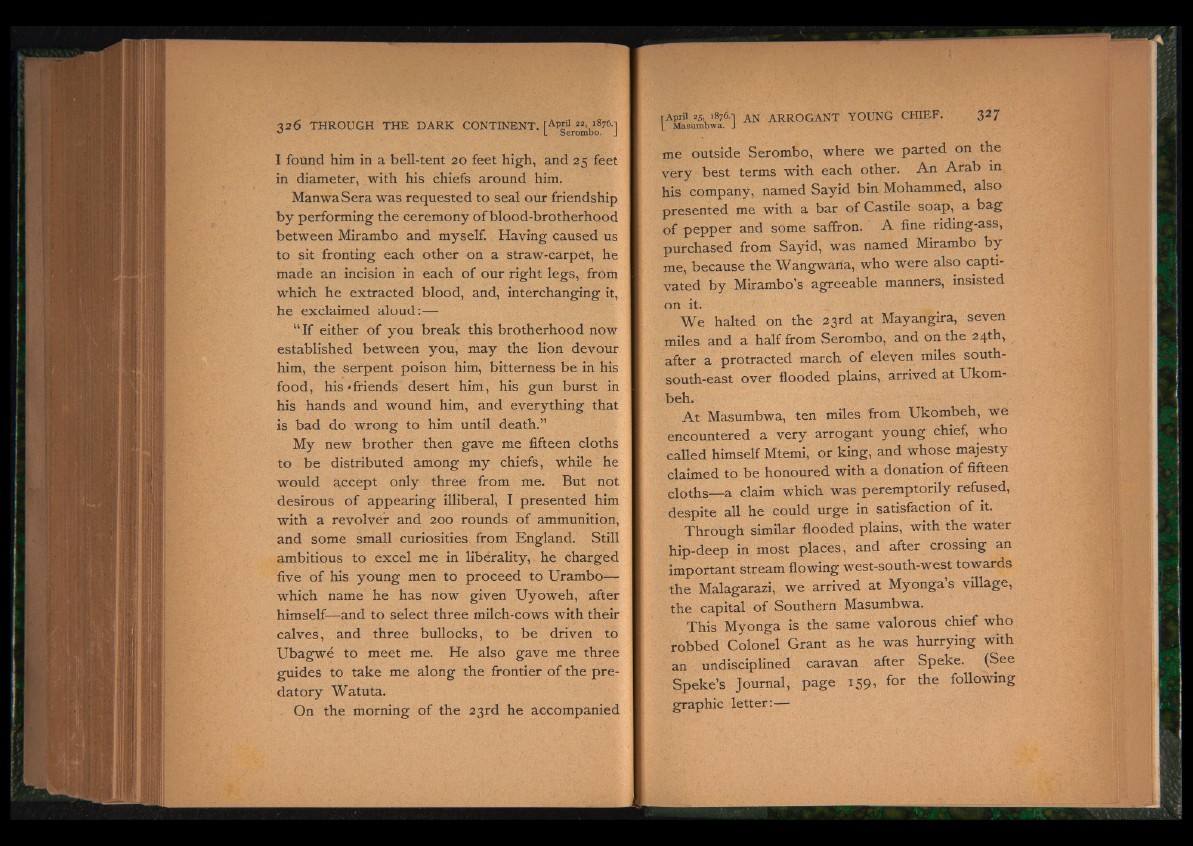
I found him in a bell-tent 20 feet high, and 25 feet
in diameter, with his chiefs around him.
ManwaSera was requested to seal our friendship
b y performing the ceremony ofblood-brotherhood
between Mirambo and myself. Having caused us
to sit fronting each other on a straw-carpet, he
made an incision in each of our right legs, from
which he extracted blood, and, interchanging it,
he exclaimed aloud:—
“ If either o f yo u break this brotherhood now
established between you, may the lion devour
him, the serpent poison him, bitterness be in his
food, his »friends desert him, his gun burst in
his hands and wound him, and everything that
is bad do wrong to him until death.”
My new brother then gave me fifteen cloths
to be distributed among my chiefs, while he
would accept only three from me. But not
desirous o f appearing illiberal, I presented him
with a revolver and 200 rounds o f ammunition,
and some small curiosities from England. Still
ambitious to e x cel me in liberality, he charged
five o f his young men to proceed to Urambo—-
which name he has now given Uyoweh, after
himself— and to select three milch-cows with their
calves, and three bullocks, to be driven to
Ubagwe to meet me. He also gave me three
guides to take me along the frontier o f the pred
ato ry Watuta.
. On the morning o f the 23rd he accompanied
me outside Serombo, where we parted on the
v e ry best terms with each other. An A rab in
his company, named Sayid bin Mohammed, also
presented me with a bar o f Castile soap, a b a g
o f pepper and some saffron. A fine riding-ass,
purchased from Sayid, was named Mirambo b y
me, because the Wangwana, who were also captivated
b y Mirambo’s agreeable manners, insisted
on it.
W e halted on the 23rd at Mayangira, seven
miles and a half from Serombo, and on the 24th,
after a protracted march o f eleven miles south-
south-east over flooded plains, arrived at Ukom-
beh.
A t Masumbwa, ten miles from Ukombeh, we
encountered a v e ry arrogant yo u n g chief, who
called himself Mtemi, or king, and whose majesty
claimed to be honoured with a donation o f fifteen
cloths— a claim which was peremptorily refused,
despite all he could urge in satisfaction o f it.
Through similar flooded plains, with the water
hip-deep in most p lace s, and after crossing an
important stream flowing west-south-west towards
the Malagarazi, we arrived at Myonga’s village,
the capital o f Southern Masumbwa.
This Myonga is the same valorous chief who
robbed Colonel Grant as he was hurrying with
an undisciplined caravan after Speke. (See
S p ek e ’s Journal, p ag e 159, for the following
graphic letter:—